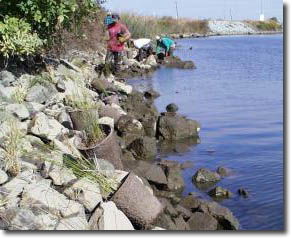Workshop identifies research needs to protect levees
Approximately 60 research scientists, engineers, policy makers and agency representatives from around California gathered recently for a two-day workshop to define research needs in order to manage the flood risks facing California’s levees.
The workshop, held at the University of California Center in Sacramento, covered a wide range of risks facing levees in the Sacramento-San Joaquin Delta and the Central Valley – from seismic risks and infrastructure frailty risks to climate change and risks associated with urbanization and inappropriate land development.
“The Sacramento-San Joaquin Delta and levees are complex and extremely vulnerable. This workshop delineated a critical need to understand how all the parts and aspects of the Delta interact as a system, so that society can make wise choices about investing in the future of this vital resource,” said Jane C.S. Long, associate director for Energy and Environment at Lawrence Livermore National Laboratory.
Concern over the viability of the Sacramento-San Joaquin Delta and levee system has increased in recent years, due in part to the Jones Tract levee failure in 2004, the Hurricane Katrina disaster in New Orleans and the recent centenary of the 1906 earthquake. The Delta is crucial to California’s agricultural economy.
With several groups now investigating the wide variety of hazards facing the Delta, the Center for Catastrophic Risk Management and the California Center for Environmental Law & Policy at UC Berkeley and Lawrence Livermore co-sponsored the workshop.
“The session brought together California policymakers with some of the nation’s leading technical experts,” summarized Dan Farber, professor of law at UC Berkeley and director of the Environmental Law Program. “The group identified critical gaps in our knowledge about the enormously complex Delta system, including the impact of climate change on flood risks.”
“This workshop generated a new paradigm for viewing the Delta system that promises to bring together many competing interests to work on a common sustainable solution to delta concerns,” added Dave Mraz, program manager for the California Department of Water Resources’ Delta Levees Program.
Over the two days the forum:
- Identified current vulnerabilities facing the levees, such as structural failure, seismic loading, flooding, terrorism;
- Considered longer-term challenges such as climate change, sea level rise and water supply implications; and
- Defined research requirements to fill gaps in knowledge and reduce uncertainties in hazard assessments.
“One of the key goals was to broaden the focus from seismic risk to the flood risks associated with climate change and rapid urban growth, and from engineering issues to the economic, legal and institutional factors that can have a crucial influence on the success of efforts at disaster prevention, response and recovery and, hence, determine California’s flood damage exposure” said Michael Hanemann, professor of environmental economics and policy at UC Berkeley, and director of the California Climate Change Center there.
The workshop then turned to development of a detailed list of short-term and long-term research and tool development needs, including research priorities for problem definition, prediction, management tools, policy approaches, technology development, data collection and more. A report will be prepared summarizing the workshop’s findings.
Raymond Seed, a professor of civil engineering at UC Berkeley, summarized the workshop by noting, “In the wake of the recent disaster in New Orleans, there is now an increased awareness of California’s own levee fragility and flood risk exposure. These are complex issues, requiring levels of teamwork and collaboration among numerous technical disciplines, and this workshop has been a valuable step in that regard.”
Founded in 1952, Lawrence Livermore National Laboratory has a mission to ensure national security and to apply science and technology to the important issues of our time. Lawrence Livermore National Laboratory is managed by the University of California for the U.S. Department of Energy’s National Nuclear Security Administration.
Contact
Lynda Seaver[email protected]
925-423-3103
Related Links
LLNL’s Energy and Environment DirectorateUC Berkeley’s Center for Catastrophic Risk Management
California Center for Environmental Law & Policy






